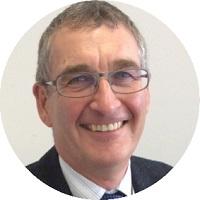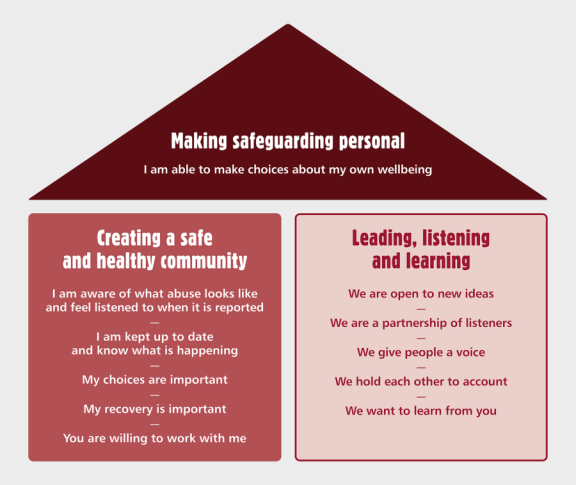Annual report for 2019-20
Contents
Foreword
The Care Act 2014 states that every local authority must have a Safeguarding Adults Board (SAB). The SAB is a partnership of organisations working together to prevent abuse and neglect of adults in need of care and support.
If someone experiences such behaviour, they have a duty to respond in a way that supports their choices and aids their wellbeing. The act also requires each SAB to produce an annual report listing its activities, progress and achievements.
A key aspect of all safeguarding work is to listen to, and, whenever practical, take into account the wishes and experiences of those residents who have been victims of abuse and or neglect: ‘Making Safeguarding Personal’. Annual reports normally give written examples of such engagement, invariably through the perspective of the organisation, not the individual.
We wanted to be different by bringing the work of the board ‘to life’. This annual report is, I believe, unique. It allows a platform to hear from Lisa who slept rough on the streets of Hammersmith for 7 years. Donna describes her experiences of trying to find the best residential accommodation for her adult brother Andre who has a mental age of a toddler.
Both examples vividly demonstrate the application of ‘Making Safeguarding Personal’, and the filmed interviews with representatives from a range of organisations working in the borough, give first-hand testimonies of how everyone strives to put the needs of the individual first.
Like everyone else over the past 15 months, our work has been dominated by the impact of the pandemic on society. One of the consequences has been to delay the intended publication of this report.
Examples of the various responses to the pandemic are included in some of the interviews. As someone who is not a ‘professional’, I have been very humbled by the dedication and resilience shown by so many people working to make everyone safe, particularly when some of them have suffered personal loss as a result of Covid.
Thank you.
Yet despite all the pressures and demands caused by the pandemic, the board continues to devote time to other areas of abuse. Scams sadly are on the increase, and the pandemic brought into sharp focus the plight of the borough’s rough sleepers. Our work continues to provide the best solutions for those residents who need help due to self-neglect and hoarding, and sadly, domestic abuse is still a significant blight on many residents’ lives.
Thank you to everyone who agreed to participate in the report. I would like to record my thanks to our filmmakers Francesca Tesler, Teodosia Dobriyananova and Alexandra Peake who drew the animations for Lisa’s story.
I hope you enjoy watching and reading about our work.

Mike Howard
Chair of the Hammersmith and Fulham Safeguarding Adults Board
May 2021
Our priorities
When we thought about our priorities, we wanted to know from local people, “What is important to you?”
Their replies led us to create our adult safeguarding strategy. One key message was that any strategy is written in easy-to-understand language so it is displayed as a ‘house’, which is built upon the foundations of wellbeing and safety.
People said that they do not want to be seen as victims, and want to be in control of the decisions they make about their life, even when they have experienced abuse or neglect.
Residents want to know what to do when they themselves, or someone they know, is being neglected or abused, by someone else. Most importantly, they want to be listened to and involved in any decisions made by other people about them.
We said that we want to be leaders who listen and learn from what people are telling us. Our strategy underpins the work of the board: all its safeguarding adults’ activity is focused on being led by the individual, ensure that the resolution of their concerns meets their needs and improves their quality of life, wellbeing and safety.
Our adult safeguarding strategy

Making safeguarding personal
What you said to us:
- I am able to make choices about my own wellbeing
Creating a safe and healthy community
What you said to us:
- I am aware of what abuse looks like and feel listened to when it is reported
- I am kept up to date and know what is happening
- My choices are important
- My recovery is important
- You are willing to work with me
Leading, listening and learning
What we said:
- We are open to new ideas
- We are a partnership of listeners
- We give people a voice
- We hold each other to account
- We want to learn from you
What does this mean in practice?
The board is committed to demonstrating the application of the strategy to our work. The past year has been dominated by the response to the pandemic.
Examples of how board members have worked tirelessly over the past year to ensure that residents are kept safe and well during these extraordinary times are mentioned in their interviews within the report.
However, we have also been conscious that other areas of safeguarding needed and continue to need, our attention and focus. So the board has devoted time to addressing the following areas of business.
Financial abuse
The board continues to raise awareness amongst local residents of the need to be alert to potential scams and other forms of financial abuse. Board members promote the work of the council’s Trading Standards team, increase awareness of national schemes and make available links to work of agencies such as the Metropolitan Police.
For more information, please watch the interview with Doug Love.
Homelessness and rough sleeping
The immediate response to the pandemic last spring included a government-funded initiative to provide accommodation for the borough’s rough sleepers. As part of the board’s response to this important area of safeguarding, it created a homelessness and rough sleepers’ working group, chaired by Julia Copeland.
This work continues and Julia’s interview gives more details about the response to helping rough sleepers find suitable accommodation.
The report includes an interview with a former rough sleeper, Lisa, which shows how she has had her life transformed once she had been given her own flat.
Co-ordination between multi-agency panels
The council hosts and supports several panels with members drawn from a number of agencies and organisations working across the borough. However, following feedback from its members, the SAB has been working with the chairs of these panels to ensure a wider understanding of their terms of reference and prevent duplication of response.
In short, the right case is heard by the right panel.
The board’s Developing Best Practice (DBP) sub-group has been working on this project and it is already having an effect as shown in the example below from the High Risk Panel.
Another area of work for the DBP has been working with the safeguarding hub within Adult Social Care (ASC) to influence the design and content of the safeguarding referral form.
Shazia Deen who is the Head of Safeguarding for ASC, also co-chairs the DBP.
As a result of feedback from many quarters, including the DBP, the form has been amended to be shorter, more concise and only ask for the most relevant information at the initial assessment stage and designed to reduce inappropriate referrals and most importantly, ensure a speedy response to address any concerns.
This is another example of Making Safeguarding Personal and you can hear more about Shazia’s work in her interview.
Hoarding and self-neglect - High Risk Panel
The High Risk Panel is committed to minimising the adverse effects of hoarding such as fire risks. The panel is co-chaired by the Borough Commander of the London Fire Brigade and a senior manager from the Adult Social Care department at Hammersmith & Fulham Council. It is attended by various SAB agencies who are members of the panel who are committed to raising awareness of fire safety.
The panel’s work is centred around finding solutions together to support individual residents who hoard or self-neglect where other attempts have not been successful.
One such case involved an unkempt disabled man with no food living alone in a dirty house without any amenities. He was suffering from schizophrenia and was a heavy drinker. He was discussed at panel meetings and his case was progressed by a housing officer in conjunction with the local psychiatric nurse.
Following their intervention, he was registered with a GP, had an appointment with a specialist at Charing Cross Hospital to help with his disability and one with a psychiatrist. He now receives the right level of housing benefit and recently had a Covid vaccination.
As part of the wider partnership work with the London Fire Brigade, the local authority has embarked on learning from fatal fires which has led to a detailed plan to raise fire safety awareness, which will include fire safety training for staff.
Domestic abuse
The SAB is aware of the impact of domestic abuse upon many residents and the lockdown increased this risk of harm both physical and psychological. This is a subject mentioned by Nicci Wotton, who works at St. Mary’s Hospital, in her interview.
The board recognises that much work has already taken place across the partnership but wants to consider how it can do more to tackle this area of abuse.
Future meetings in 2021 will have themed discussions and programmes of action to increase the understanding of domestic abuse, particularly when it occurs in non-intimate relationships or falls under the phrase of ‘elder abuse’.
Interviews
Felicity Charles and Laura Seamons
Felicity and Laura both work in our Community Safety Team.
In the interview, they talk about their work in leading the Community MARAC, a group composed of many different organisations working within Hammersmith and Fulham which responds to cases of anti-social behaviour. Frequently, both the victims of this behaviour and those carrying it out have ‘vulnerabilities’ sometimes due to substance misuse or underlying mental health issues.
As an example, they describe a case of someone living in sheltered housing who was forced by drug users to allow them to use their flat for dealing. The MARAC devised a joint action plan with the involvement of both the victim and the perpetrators. This engagement made a positive difference to their lives.
Their message to anyone facing anti-social behaviour is “we are here to support you”.
Nicci Wotton and Sonia Benitez
Nicci is the Head of Safeguarding for the Imperial Healthcare Trust which provides acute and specialist healthcare in West London for around a million and a half people every year. Sonia is the Head of Services for the Carers Network and responsible for all of the carer services as well as the quality-of-service delivery.
Sonia tells of the impact of the pandemic on people’s lives - 7 million of the population of the UK were classified as ‘carers’ in 2019. The pandemic created an additional 4.5 million carers. In response, the Carers Network provided a range of services to carers such as online assessments, training and counselling and a dedicated telephone line for the 'digitally excluded'. Her work is about empowering and supporting carers and creating strong partnerships within communities.
Nicci describes the impact of Covid on patients and the emotional stress of her colleagues. Despite all the pressures, the trust has maintained a 7 day a week safeguarding service which continues to provide support to the 'lonely and isolated'.
Sadly, this isolation has led to increased incidences of domestic abuse. Her focus is to increase awareness of domestic abuse on the elderly. Her focus, which is a key theme of the work of the board, is ‘Making Safeguarding Personal’ and describes how her team has helped adults to leave abusive relationships.
Shazia Deen, Julia Copeland and Doug Love
Shazia, Julia and Doug all work for Hammersmith & Fulham Council.
As the Head of Safeguarding for Adult Social Care, Shazia talks about how her colleagues have involved residents in the safeguarding processes designed to improve their wellbeing. This is the key message of safeguarding, making sure that all interventions meet the desired needs of the individual. This is commonly known as ‘Making Safeguarding Personal’.
Shazia also talks about the response to the Covid pandemic - rearranging how services can still be delivered safely, keeping in touch with residents who were required to ‘shield’ and helping people recover from the trauma of Covid.
Julia is a strategic commissioner within the Economy department and discusses the work over the past year to support homeless persons and rough sleepers. Her goal is to provide access to safe, affordable housing and to support independent living.
She tells of her admiration for her everyone working with this most vulnerable group of people by showing compassion and dedication to their work, despite the impact of Covid upon themselves and their families.
The difference that this involvement and engagement makes to those sleeping rough is shown in the film about Lisa which forms part of this year’s annual report.
Doug is a senior trading standards officer who is responsible for enforcing consumer protection regulations. Many people, of all ages, are victims of financial abuse through scams and Doug talks about his work on tackling ‘rogue’ builders and how people who are victims do not report the crime until ‘the damage is done’ If necessary, Doug and his colleagues will make contact with Adult Social Care about a case.
He ends by saying “If suspicious, contact Trading Standards.”
Lisa’s story
Lisa was homeless for 7 years. She talks of her experiences, sleeping rough in the subways of Hammersmith Broadway station and suffering from severe depression which led her to seek medical help. Her condition was not deemed to be serious enough for treatment and was told that it was a ‘homeless issue’.
Her link was turned around when she was found by Street Link based in Shepherd’s Bush under the ‘No Second Night Out initiative’. Working with the council, Lisa had her needs assessed and she was given support to get off the streets.
This support was provided through St. Mungo’s and led to Lisa getting a studio flat of her own. St Mungo’s has been providing services to homeless people in H&F for many years and is commissioned by the council to provide a range of services such as supported housing, homeless health inclusion services and outreach services to rough sleepers. Their staff work compassionately and with great skill in their determination to make a difference to some of the borough’s most vulnerable homeless residents.
Lisa’s final words are a lesson to us all “if you see someone sleeping rough and can help them, then help. Just don’t be horrible. Anyone can be homeless”.
Donna and Andre’s story
Donna and Andre are sister and brother. Andre was born prematurely and sustained a brain injury at birth giving him a mental age of a 1-year-old child. Donna tells about how her mother set up a care home within the borough to look after Andre which she described as 'home from home'. This smaller home was taken over following her mother's death, which, following staff changes, began to give inferior care to residents. Last year, things got so bad that Andre was removed from the home by the council.
Donna describes the experiences of working with the council to find the right home for Andre as 'positive'. She felt listened to and that everyone wanted the best outcome for Andre. Andre is now very happy in his new home and this is an excellent example of the making safeguarding personal approach of the board.
View the transcript for Donna and Andre's story - this video was made the 2018-19 annual report.
The numbers
This report contains:
- statistics showing the numbers and types of people living in Hammersmith & Fulham
- information about how adults at risk of harm are protected from abuse or neglect through the use of section 42 safeguarding enquiries
- information about our person-centered approach
- statistics explaining the use of the Deprivation of Liberty Safeguards (DoLS)
- safeguarding adults review report
These figures explain the different aspects of safeguarding work.
The case of Donna and Andre shows how these activities do make a real difference to the wellbeing of one of the borough's residents.
